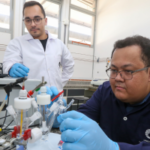Ab initio electrochemistry for applications energy material
Palestrante: Prof. Dr. Jean-Sébastien Filhol – Université de Montpellier – França
Abstract: Modeling electrochemical processes, especially at interfaces, is essential for understanding the complex reactions involved in energy conversion and storage. Since Marcus’s foundational work, the relationship between solvation and redox processes at metal anodes has been increasingly understood.[1] However, traditional models have largely relied on semi-empirical methods. To advance this field, we have developed an ab initio approach that incorporates electrode potential effects and solvation at the atomic scale, enabling the modeling of complex battery processes such as dendritic growth, electrolyte degradation, and cation reduction, as well as catalytic processes for fuel production in energy conversion systems. We first illustrate how this approach redefines our understanding of dendritic growth that is one of the problematic effect preventing an easy use of metal anodes. We then present our findings on electrode-interface degradation processes that lead to the formation of the solid electrolyte interphase (SEI) for various metal anodes (e.g., Li, Mg, Ca) using our approach.[2] Our results reveal that redox processes within the electrochemical double layer are highly intricate, often involving solvent[4,5] or ion[6] reduction. This behavior, which leads to electrolyte decomposition into degradation products, is attributed to electrophilic activation by the metal cations. Nevertheless, this degradation can be mitigated by incorporating carefully selected additives with protective functions.[7] For alkali earth cations reduction efficiency is shown to be even more complex, resulting from a delicate balance between electron transfer, solvent reorganization, and electrolyte reactivity Our study demonstrates for example that reducing Ca2+ cations at electrochemical interfaces requires a reduction of the number of coordinated solvent molecules, which permits a transition from a solvated electron-cation pair to a reduced cation. This suggests that metal cation reduction at electrochemical interfaces is more intricate than currently understood and has far-reaching implications for electrochemical applications from batteries to metal plating. Finally, we will show how this approach can be extended to other fields of energy materials such as fuel cells or fuel electro-catalytical production giving some new insights in the complexity at the associated interfaces. [1] R. A. Marcus J. Chem. Phys. 24 (1956) 966. [2] A. K. Lautar, A. Hagopian and J.-S. Filhol Phys. Chem. Chem. Phys. 2020, 22, 10569-10580. [3] A. Hagopian, M.-L. Doublet and J.-S. Filhol Energy Environ. Sci. 2020, 13, 5186-5197. [4] N. Lespes and J.-S. Filhol J. Chem. Theory Comput. 2015, 11, 3375-3382;[5] A. Kopač Lautar, J. Bitenc, T. Rejec, R. Dominko, J.-S. Filhol and M.-L. Doublet J. Am. Chem. Soc. 2020, 142, 5146-5153. [6] L. H. Nguyen, T. Picard, C. Iojoiu, F. Allouin, N. Sergent, M. L. Doublet and J.-S. Filhol Phys. Chem. Chem. Phys. 2022, 2201417. [7] A. Kopač Lautar, J. Bitenc, R. Dominko and J.-S. Filhol ACS Appl. Mater. Interfaces 2021, 13, 8263-8273Phys. Chem. Chem. Phys. 2022, 2201417. [8] L. H. B. Nguyen and J.-S. Filhol, Adv. Energy Mater. 2023, 13, 2300311.
Jean-Sébastien Filhol is a Full Professor and Vice-Dean of the Faculty of Science at the University of Montpellier, France. He is an expert in theoretical chemistry and density functional theory (DFT) simulations for complex condensed matter systems, and completed his Ph.D. in theoretical physical chemistry at the École Normale Supérieure de Lyon under Prof. P. Sautet supervision. Following postdoctoral research at the University of Virginia (with Prof. M. Neurock) and the University of Exeter (with Prof. R. Jones), he joined the University of Montpellier in a permanent position. Prof. Filhol’s research focuses on linking atomic structure to macroscopic properties (such as spectroscopy, thermochromism, thermal expansion, and polymorphism) and investigating electrochemical phenomena at electrode/electrolyte interfaces, particularly for energy applications. He has pioneered methods to incorporate electrode potential in DFT calculations, significantly advancing the understanding of electrochemical reactivity. Recently, his work in lithium-ion and post-lithium battery technology has provided new insights into challenges like dendrite formation, electrolyte instability under reductive conditions, and solid electrolyte interphase formation.His research has led to two book chapters and to 62 peer-reviewed publications in high-impact journals, including JACS, Angewandte Chemie, Energy & Environmental Science, and Advanced Energy Materials, with an h-index of 28. Additionally, Prof. Filhol is dedicated to advancing chemical education, particularly in developing innovative methods for teaching experimental chemistry at the undergraduate level.
Prof. Responsável: Pablo Sebastián Fernández





